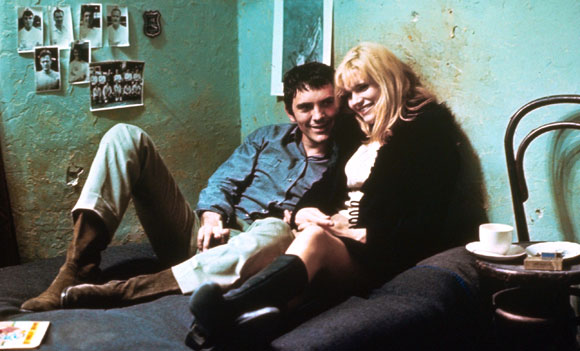Described as Ken Loach’s first “proper film” after the groundbreaking Cathy Come Home, Poor Cow has been fully restored by Studio Canal in collaboration with the BFI’s Unlocking Film Heritage programme.
 Ken Loach films are not for those who like explosions, special effects or have an idea of mainstream cinema which involves anything concerning Bruce Willis. Now I have nothing against Mr. Willis or Loach but the two are diametrically opposed in approach, initial concept and execution more than any two people I can think of.
Ken Loach films are not for those who like explosions, special effects or have an idea of mainstream cinema which involves anything concerning Bruce Willis. Now I have nothing against Mr. Willis or Loach but the two are diametrically opposed in approach, initial concept and execution more than any two people I can think of.
Ken Loach makes films of social relevance often based in a recognisable reality which is meant to instil a message. He does them addressing issues of importance using a very naturalistic approach, which are often critically acclaimed yet barely break even. So my interest in Poor Cow was noticeably more selfish than many films I agree to review.
This would be only my second Loach film, the first being Kes. My memory of the latter is foggy at best. Being young meant any underlying subtext would have been lost. With Poor Cow I went in with my eyes and ears open and came away pleasantly surprised. Classed as Loach’s first proper film after the standout success of Cathy Come Home, Poor Cow follows Carol White’s Joy as she lives inside Sixties London.
What becomes immediately apparent is how natural a performer White turns out to be. There is no sense of superficially about her performance and Loach’s improvisational style lends itself well to the set up. As a film Poor Cow is dated but only in terms of language, social attitudes and architecture. Cynics out there may feel that elements of Austin Powers may leak out in the semantics of Loach’s dialogue, but at no point do you feel like laughing.

Loach’s use of cue cards, voiceover and non-verbal internal monologue to bridge gaps in time, hark back to the French New Wave still flourishing during this period. It is not only a stylistic decision but also an economical one. It makes elements of the film slightly disjointed and unreal in spite of the improvised realism, yet this never detracts from the message being delivered or impact Poor Cow drives home.
In a sense I am glad that my encounters with Ken Loach have been limited, as it gives me perspective, a fresh pair of eyes and no preconceptions. That is how you should approach this time capsule of Sixties New Wave to fully benefit. It is interesting as a snapshot of time, place, approach and technique for someone who remains a very important British filmmaker. Loach’s output may have slowed in recent years, but Poor Cow is a reminder of where it started and who continues to influence our industry almost fifty years later.



